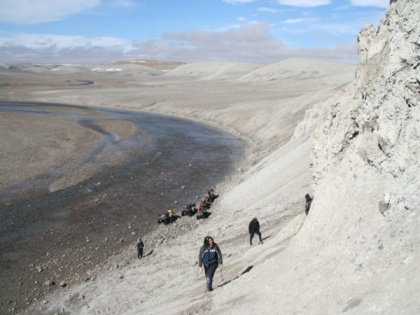Scientists study if meteorite impacts help create life on Earth and beyond
By ANI | Published: September 3, 2020 09:05 AM2020-09-03T09:05:12+5:302020-09-03T09:20:18+5:30
A new study, posits that impact craters should absolutely be considered by space agencies like NASA and ESA as top exploration targets, not just for their invaluable post-impact geological records, but also -- and perhaps more importantly -- as prime locations for seeking potential habitats for extraterrestrial life.

Scientists study if meteorite impacts help create life on Earth and beyond
A new study, posits that impact craters should absolutely be considered by space agencies like NASA and ESA as top exploration targets, not just for their invaluable post-impact geological records, but also -- and perhaps more importantly -- as prime locations for seeking potential habitats for extraterrestrial life.
The study has been published today in Astrobiology.
"There are a lot of hypotheses for where life started on Earth and where we should look for life on Mars, but we are actually overlooking a major geological force and a key habitat in understanding the origin of life and that's meteorite impacts and their resulting craters," said Osinski, Director of Western's Institute for Earth and Space Exploration (Western Space).
Leading an international team with investigators from the University of Edinburgh, Georgetown University, and the University of Southern California, this new study is grounded in Osinski's extensive fieldwork and laboratory studies of meteorite impacts over the past two decades.
"If you ask anyone to imagine what happens when you have kilometre-size chunks of rock hitting the Earth, it's typically destructive. It's an extinction event like the one that killed the dinosaurs," said Osinski.
"What we're trying to do here is turn that idea upon its head and say yes, the impact is initially destructive, but it also delivers the building blocks for life and creates new habitats for life. They [impact craters] essentially create an oasis for life," added Osinski.
Osinski and collaborators propose that given the pervasive nature of impact events and their increased frequency during the first 500 million years of Solar System history that meteorite impact craters may represent the most likely sites where life originated on Earth. Unfortunately, says Osinski, we'll never really know.
"I put my money on meteorite impacts as the place where life could have originated on Earth, but we'll never know," said Osinski, also Professor in Western's Department of Earth Sciences.
"Unfortunately, due to billions of years of erosion, plate tectonics, and volcsm, we've lost the vast majority of the ancient rock record on Earth. So we're never going to know exactly where or even when, to be honest, life originated on Earth," added Osinski.
But maybe it's not too late for the Red Planet.
By exploring Mars with rovers like Perseverance and ExoMars, Osinski believes planetary scientists might eventually figure out the origin of life -- and they just might -- as long as they are looking in the right place.
"There are other impact craters on Mars that may have been better to explore with these ideas in mind. But Perseverance is going to land in Jezero Crater and there is evidence of minerals such as clays formed through hydrothermal activity," said Osinski.
"It's a good place to start to explore the role of meteorite impacts in the origin of life, as long as they look out for the habitats, nutrients, and building blocks for life that we outlined in our study," added said Osinski.
To date, 200 impact craters have been investigated and confirmed on Earth using fieldwork, geophysics, satellite data, and various laboratory analysis techniques in pioneering laboratories at Western and others around the world.
Osinski and his team have collected and posted relevant data for all 200 craters as part of Western's Impact Earth initiative.
( With inputs from ANI )
Disclaimer: This post has been auto-published from an agency feed without any modifications to the text and has not been reviewed by an editor
Open in app